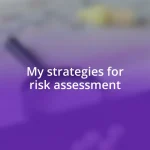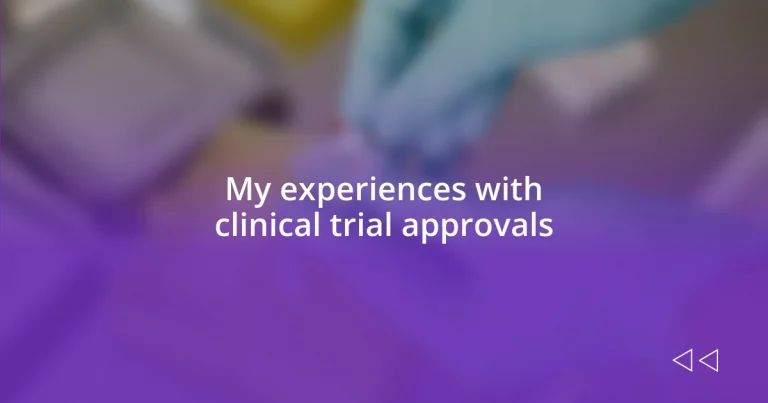Key takeaways:
- The clinical trial approval process involves complex challenges, highlighting the need for patience, resilience, and collaboration among researchers.
- Effective communication and proactive planning are essential for navigating regulatory hurdles and fostering a collaborative relationship with regulatory agencies.
- Self-care and embracing diverse perspectives within teams are crucial for maintaining focus and promoting innovative solutions during demanding phases of clinical trials.
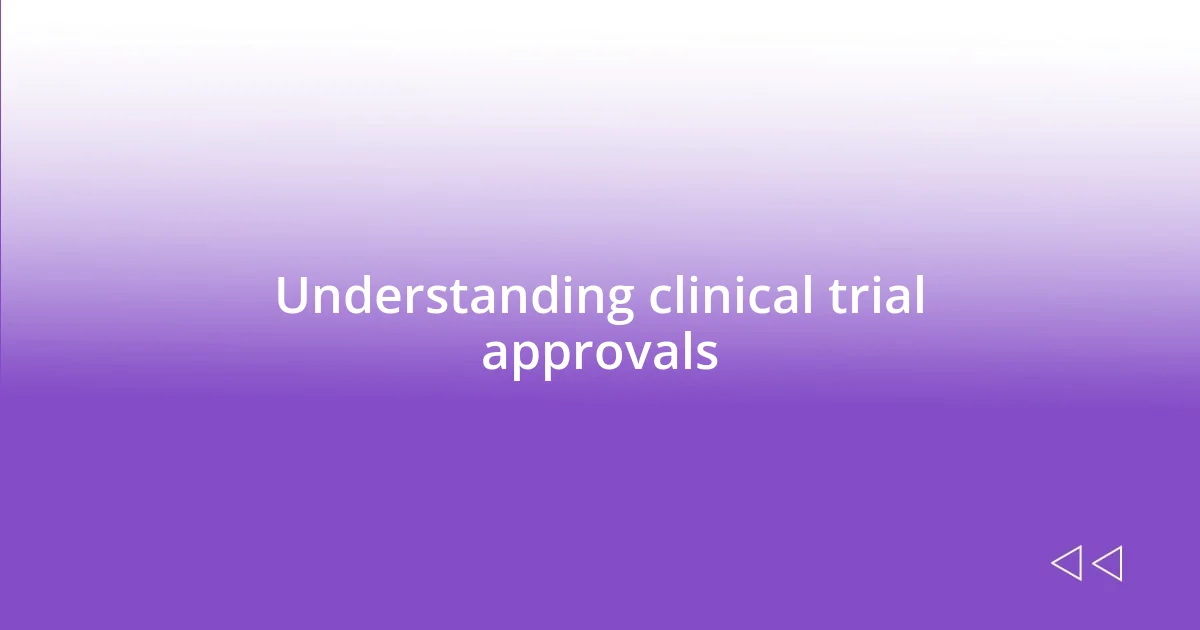
Understanding clinical trial approvals
Understanding clinical trial approvals is essential for anyone involved in the healthcare field. I remember going through the approval process for a trial I was heavily invested in, feeling a mix of anticipation and anxiety as I awaited the regulatory verdict. How often do we stop to think about the intricate web of regulations that safeguard patients while promoting medical innovation?
Each phase of the approval process unveils challenges that researchers must navigate, from ethical considerations to rigorous data evaluations. It struck me how each decision could impact not just the study’s outcome but also the lives of those waiting for new treatments. Isn’t it fascinating that behind every drug we see on the shelf, there’s a story of meticulous scrutiny and passionate advocacy?
As the trials progress, the approval stages evolve, requiring constant adjustments based on collected data and emerging insights. I can still feel the weight of the moment when all the hard work, sleepless nights, and unwavering dedication culminated in that hard-earned sign-off. Can you imagine the relief and hope that enveloped us, knowing we were one step closer to potentially changing lives?
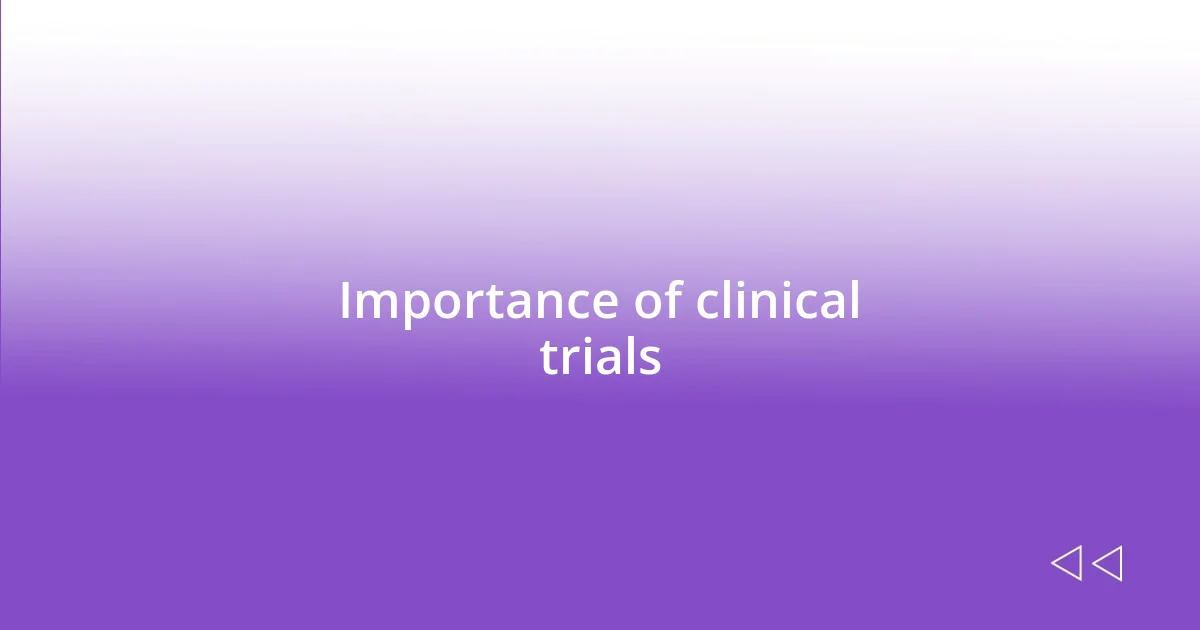
Importance of clinical trials
Clinical trials are the cornerstone of medical advancement. Each trial unlocks new knowledge, paving the way for breakthroughs that can transform healthcare. I vividly recall attending a presentation about a trial that revealed a new approach to treating a chronic illness. The excitement in the room was palpable; it felt like we were on the brink of discovering something truly revolutionary.
What strikes me most is how clinical trials ensure patient safety while pushing the boundaries of science. I once collaborated on a project where the participants shared their experiences. Their courage and hope reminded me of the human element behind each trial. It’s a delicate balance—ensuring rigorous testing while honoring the trust these individuals place in researchers.
Moreover, the success of clinical trials can lead to immediate benefits for patients by bringing new treatments to the market faster. I remember being in touch with a patient who was anxiously awaiting trial results for a drug that could change her health dramatically. Her resilience and hope were inspiring, and they underscored the profound impact that successful trials can have on real lives. It’s important to recognize that behind every dataset, there’s a story—a human story—that gives meaning to our work.
| Importance of Clinical Trials | Impact |
|---|---|
| Advancing Medical Knowledge | Unlocks new treatments and therapies |
| Ensuring Patient Safety | Rigorous testing protocols protect participants |
| Expediting Market Access | New drugs can reach patients more quickly |

Personal journey through approvals
Navigating the approval process for clinical trials can often feel like traversing a labyrinth. I recall one instance where our team faced a significant regulatory hurdle that threatened to delay our timeline. It was during a late-night meeting, fueled by coffee and determination, that we brainstormed possible solutions. The collective resilience and commitment of my colleagues truly uplifted the atmosphere, transforming frustration into motivation. This shared experience reinforced for me that every setback is an opportunity for collaboration and innovation.
- Experiencing unexpected regulatory challenges sharpened our ability to adapt.
- Late-night brainstorming sessions became a source of camaraderie and creativity.
- Each hurdle was a learning moment, emphasizing the importance of teamwork in decision-making.
- We discovered innovative ways to present our data, leading to a deeper understanding of the approval landscape.
Looking back, those moments of tension and triumph are what shaped my understanding of the approval process. I vividly remember the palpable tension in the room when the regulatory committee convened to review our application. As we awaited their feedback, I could feel a swirl of hope and anxiety. It was a testament to the stakes involved—not just for us as researchers but for the patients whose lives hung in the balance. I learned firsthand that patience and perseverance are paramount, turning waiting into a powerful exercise in faith and dedication.
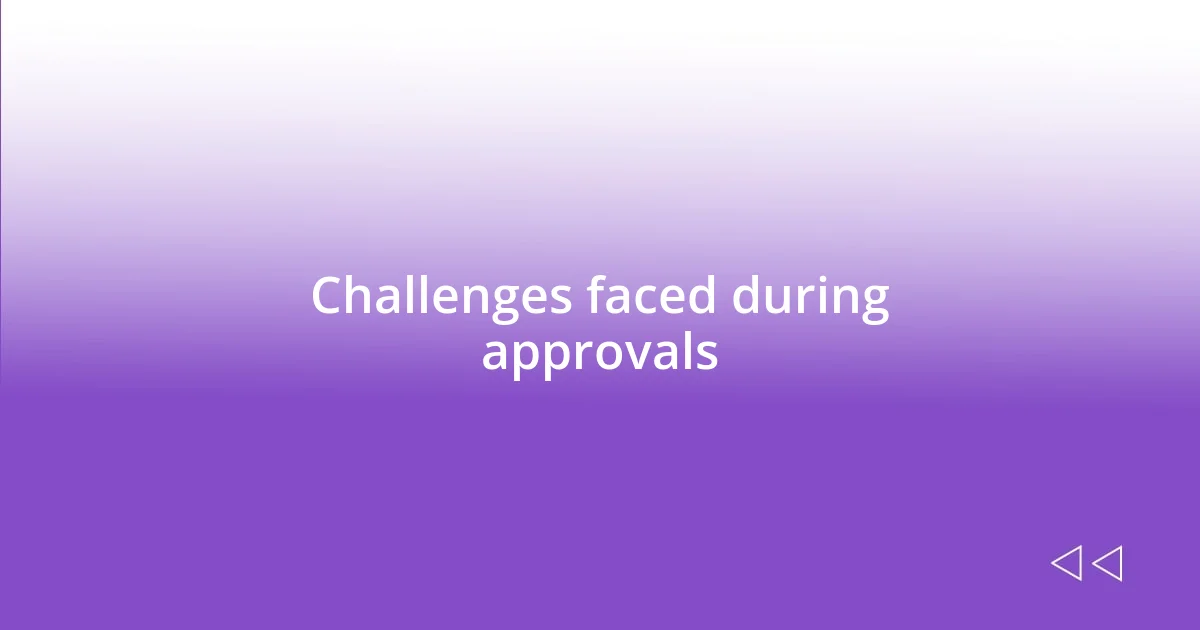
Challenges faced during approvals
I remember one of the toughest challenges our team faced during the approval process was grappling with conflicting interpretations of regulatory guidelines. It felt frustrating, like trying to solve a puzzle with missing pieces. I still recall the moment when we decided to seek clarification directly from the regulatory body; it was humbling yet empowering to realize that even the most seasoned professionals sometimes need to ask for help. Have you ever found yourself in a similar position, where clarity seemed just out of reach?
Another significant hurdle was managing the expectations of all stakeholders involved. Balancing the urgent demands from our sponsors with the meticulous requirements of the regulatory agencies felt like walking a tightrope. I remember a candid conversation with our lead investigator where we discussed the emotional toll this pressure could take on the team. There were moments when I felt the weight of every decision, knowing that our timelines could significantly impact patients awaiting new treatment options. How do we maintain our focus in such stormy seas of uncertainty?
There were days I felt like I was in a never-ending feedback loop, revising documents to meet the exacting standards of approval. Each submission felt like a performance; the anxiety was palpable, especially when waiting for feedback. On one memorable occasion, we received extensive comments that left us feeling disheartened—until we chose to see them as a roadmap to improvement. This experience taught me that challenges can forge resilience, transforming what might feel like setbacks into stepping stones towards success. Isn’t it fascinating how every roadblock can teach us something invaluable?
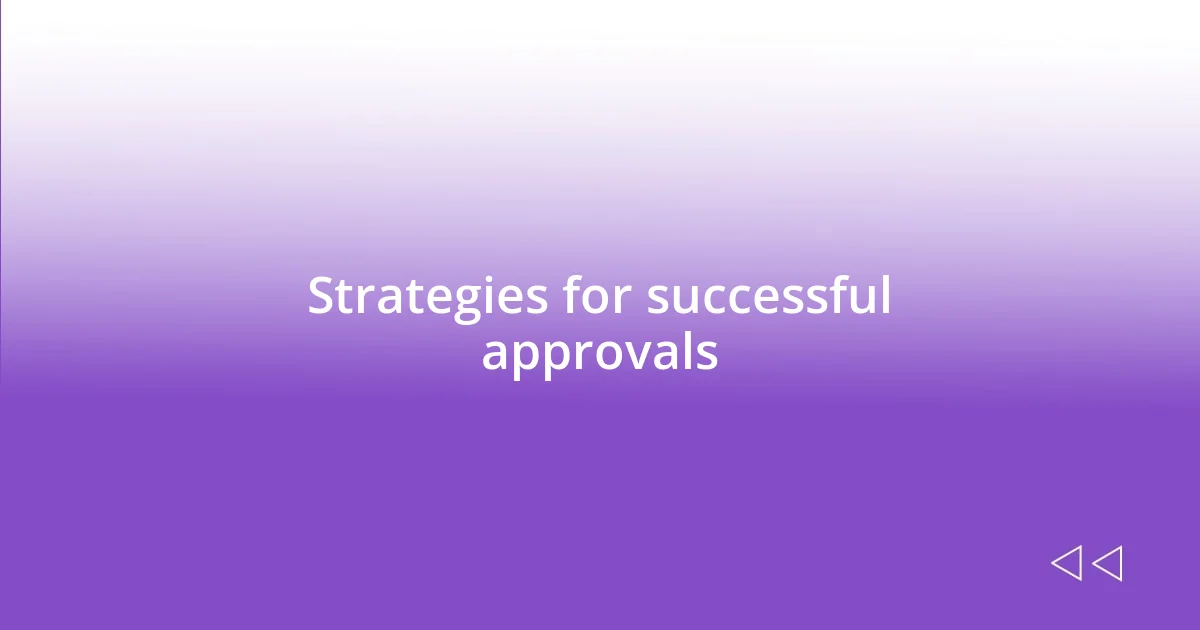
Strategies for successful approvals
When it comes to securing successful clinical trial approvals, a proactive approach is essential. I recall a particularly nerve-wracking phase when we decided to map out a comprehensive timeline, complete with critical milestones for each document submission. This not only kept our team organized but also created a shared accountability that made the process more transparent and manageable. Have you ever experienced the relief that comes with a well-laid plan?
Communication plays a crucial role in navigating this complex landscape. One time, we scheduled regular check-ins with the regulatory team, which allowed us to address concerns before they escalated. It was a simple step, yet it transformed our relationship from distant to collaborative. The difference was palpable—rather than feeling like we were constantly chasing approval, we became partners in the process. Isn’t it amazing how a dialogue can change the dynamics of a relationship?
Lastly, embracing flexibility turned out to be a game changer for us. I remember a moment when, despite having meticulously prepared our initial application, a sudden regulatory change caught us off guard. Instead of spiraling into panic, our team rallied. We quickly revised our strategy, using the new guidelines as a springboard for innovation. That shift not only positioned us for success but also taught me the importance of resilience in the face of uncertainty. How often do we underestimate the power of adaptability in our professional lives?

Lessons learned from my experience
Reflecting on my journey, one key lesson was the value of patience. In one instance, I was caught up in the whirlwind of multiple revisions—waiting for feedback felt like an eternity. This taught me that slowing down and allowing time for thorough reviews could ultimately save us from larger setbacks down the road. Have you ever wished you had taken a moment to breathe before diving into the next phase?
Another lesson that struck me was the power of teamwork. Collaborating with cross-functional teams opened my eyes to diverse perspectives, especially during challenging phases. I vividly remember a brainstorming session where a junior member suggested an alternative approach that we hadn’t considered. That moment reminded me to listen and embrace inputs from everyone, no matter their level of experience. Isn’t it remarkable how innovation often springs from the most unexpected places?
Lastly, I learned that self-care is non-negotiable in this demanding field. During a particularly intense period, I neglected my well-being, thinking it was necessary for success. However, that took a toll on my focus and efficiency. I came to realize that taking breaks and nurturing my mental health not only benefited me but also fostered a more productive environment for my team. How often do we prioritize our health in the face of pressing deadlines?






